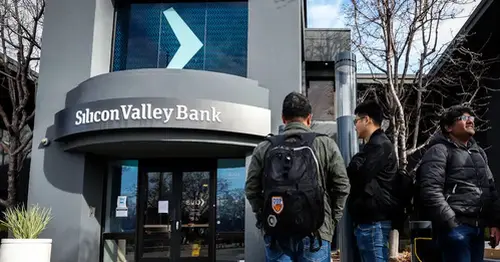
Senators introduce bill to claw back executive compensation after SVB's and Signature Bank's collapses
A bipartisan group of senators introduced legislation to give regulators the authority to claw back executive compensation and bonuses from failed banks following the collapses of Silicon Valley Bank and Signature Bank this month.
Democrats Elizabeth Warren of Massachusetts and Catherine Cortez Masto of Nevada and Republicans Josh Hawley of Missouri and Mike Braun of Indiana are proposing a bill dubbed the Failed Bank Executives Clawback Act, which would mandate that federal regulators return to a bank all or part of the compensation its executives had received in the five years leading up to a bank’s failure.
The measure would clarify the requirements on the Federal Deposit Insurance Corp. and extend Dodd-Frank Act authorities on clawbacks to apply to banks in FDIC receivership, Warren's office said in a news release. Following the collapses of SVB and Signature Bank, the FDIC stepped in to guarantee money to the failed banks’ customers.
The legislation would also ensure that when an insured depository institution affiliated with a bank holding company fails, investors in the holding company bear the losses of that institution, the release said.
CBS News first reported the proposed legislation Wednesday.
"If the federal government is going to step in to cover bank deposits well beyond the $250,000 FDIC limit, bank executives need an extra incentive to manage risk," Braun said in a statement to NBC News. "This bill to claw back bank executive compensation when the FDIC comes in to bail out a bank is necessary."
The release of the proposed legislation comes a day after the Senate Banking Committee held its first hearing into the collapses of SVB and Signature Bank, two of the largest bank failures in U.S. history.
Michael Barr, the Federal Reserve Board's vice chair for supervision, testified that the “SVB’s failure is a textbook case of mismanagement,” citing the bank’s “concentrated business model” in technology and venture capital, its rapid growth from 2019 to 2022, and its failure to “effectively manage the interest rate risk” of its securities.
During the hearing, Cortez Masto raised concerns about SVB and Signature Bank executives taking bonuses in the days leading up the banks’ collapses.
FDIC Chair Martin Gruenberg said the FDIC has substantial authority to “impose money penalties, restitution, and banning individuals” from the banking industry depending on the findings of their investigation.
In a statement to NBC News, Cortez Masto said it is “unacceptable” for executives at SVB or any other major financial institutions to “pay themselves millions in bonuses while running their banks into the ground.”
“This bipartisan legislation will make sure we are holding these individuals accountable for threatening the financial stability of businesses and families in Nevada and across the country,” she said.
Hawley echoed the point: “Bank executives who make risky investments with customers’ money shouldn’t be permitted to profit in the good times, and then avoid financial consequences when things go south,” he said. “This legislation puts the executives’ own profits on the line, and that’s exactly as it should be.”
The proposed legislation also comes after President Joe Biden urged Congress to pass legislation that would make it easier for the government to rescind bonuses and stock sale gains collected by executives whose actions cause bank failures, in a response to the recent collapses of two banks.
“The president called on Congress to pass a new law to hold failed bank CEOs accountable and give the financial cops on the beat additional authority to clawback lavish pay and bonuses when executives explode their bank — and this bipartisan bill answers that imperative,” Warren said in a statement Wednesday.






